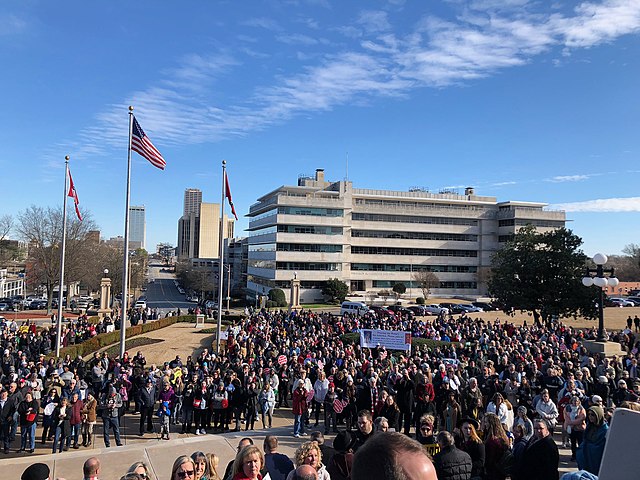
Published June 27, 2022
The law, too, belongs to cultural history. A decision of the Supreme Court struggles to connect to a timeless principle. But a decision always connects, as well—almost unconsciously, as if talking in its sleep—to its particular moment in the nation’s life.
Think about Roe v. Wade (1973) and Dobbs v. Jackson Women’s Health Organization (2022) as an exercise in time-lapse photography. Those decisions were, respectively, the beginning and the end of a 50-years-long American chapter dealing with the subject of abortion. Those 50 years coincide, precisely, with the adult lifetimes of the oldest members of the baby boom generation, who were in college or law school at the time that Roe was handed down—or were just starting out in their public careers (think of Bill and Hillary Clinton). Now they are settling into old age.
The Roe decision, a revolution, came at the height of the Gloria Steinem wave of feminism. The late sixties and early seventies were the seedbed of the American culture wars—those struggles that began just after the passage of the Civil Rights Acts of 1964 and 1965, when the conflict moved on from the legal to the cultural battlefield.
The old authorities had failed. The cultural elites were engaged at the time of Roe in a sheepish mind-meld with the countercultural young; those elites (who mostly had avoided the draft) recoiled against the humiliation of the lost war in Vietnam and against Richard Nixon (the abortion decision came in the midst of Watergate, as the damning facts seeped out) and against the dismal earlier rule of Lyndon Johnson. They despised the regime of discredited old men (the country hadn’t been any good since Jack Kennedy died) and they pined for new, enlightened gestures. Bliss was it in that dawn to be alive / But to be young was very heaven! The weak Roe ruling (even Justice Ruth Bader Ginsburg thought it lame as a matter of constitutional law) became part of the ardent overreach of the time. Roe, too, seemed like a victory of the young elites against the Old Believers—the unwashed Silent Majority that Spiro Agnew had been courting. Later in 1973, Agnew had to resign as vice president. It seems that in his days as governor of Maryland, he had a habit of accepting bribes delivered in brown paper bags.
The generational theme was pervasive in those days. The sexual revolution, a phenomenon of youth, had produced its natural consequences, despite the best efforts of the pill to prevent that kind of trouble. So Roe was a practical blessing. The ruling elites (in the media, in the universities and the arts, in the government, in corporations) had been badly shaken by the second half of the sixties and by their own failures (Vietnam was only part of the story). They sought to appease the multitude of boomers, who were, after all, the coming thing, and, in the end, the victors as the country emerged from the 1960s.
All these elements were part of the zeitgeist that surrounded the Roe decision. I do not mean to say that the decision’s author, Justice Harry Blackmun, a Minnesotan sent to the court by President Nixon in 1970, was either a hippie or a fool. He was 65 at the time and had started out on the bench as a conservative. He would eventually become the most liberal and (some would argue) most humane justice. But I do propose that the reasoning and language of Blackmun’s Roe decision (in what he said and what he left out) were influenced by the ambient cultural energies of that vivid time: by what magazine editors used to call “the psychic surround.”
Wisdom on the left embraces the idea that last week’s decision in Dobbs was essentially—feloniously—political: an act of Trumpian brutalism. But that formulation is upside down. The energies of the boomer elites (going back to civil rights days and the antiwar movement) have always been ferociously, theatrically political. Their victories in the 1960s were mostly achieved by performance politics—dissent, disobedience, protest—rather than by the conventional instruments of constitutional process. It was the elected politicians (Johnson, Nixon) who were their villains. Younger generations inherited from the boomers certain ideological and anti-democratic preferences—including a faith in political theater and hyperbole and even hysteria, which have now been amplified a thousandfold by social media. Rioting has become one of the most familiar and accepted forms of American theater. Women dress up in costumes from The Handmaid’s Tale and beat upon the doors of the Supreme Court.
The truth about Dobbs is—or ought to be—anticlimactic. Anti-theatrical, too: what the Court has done is to try, at last, to take the difficult, painful subject of abortion out of the hands of baby boomers and their heirs-in-performance and allow it to be sorted out, democratically, in the legislatures of the 50 states.
Lance Morrow is the Henry Grunwald Senior Fellow at the Ethics and Public Policy Center. His work focuses on the moral and ethical dimensions of public events, including developments in regard to freedom of speech, freedom of thought, and political correctness on American campuses, with a view to the future consequences of such suppressions.
Lance Morrow is the Henry Grunwald Senior Fellow at the Ethics and Public Policy Center. His work focuses on the moral and ethical dimensions of public events, including developments in regard to freedom of speech, freedom of thought, and political correctness on American campuses, with a view to the future consequences of such suppressions.





